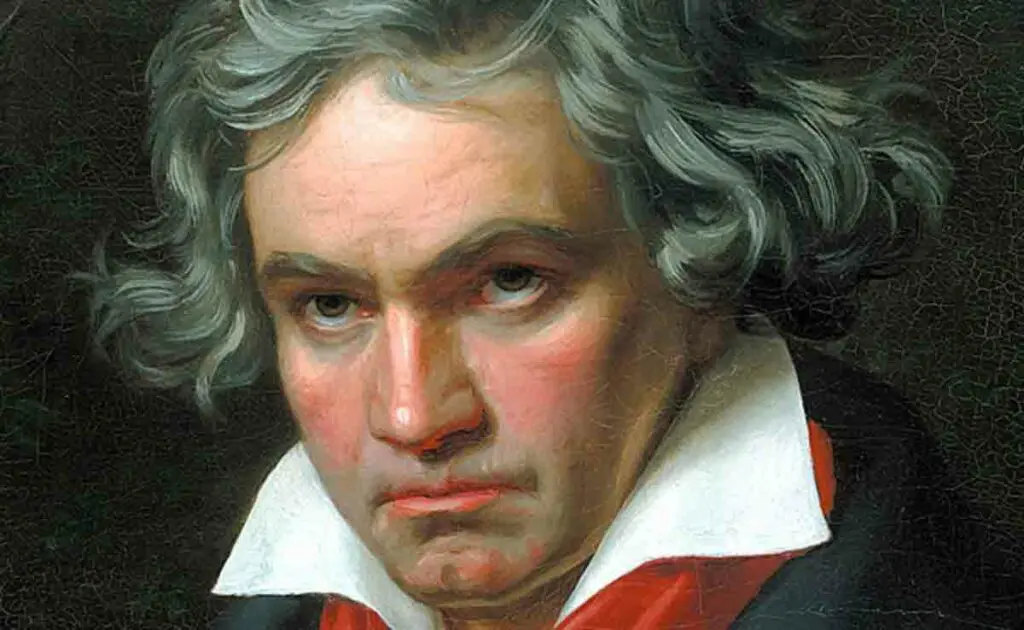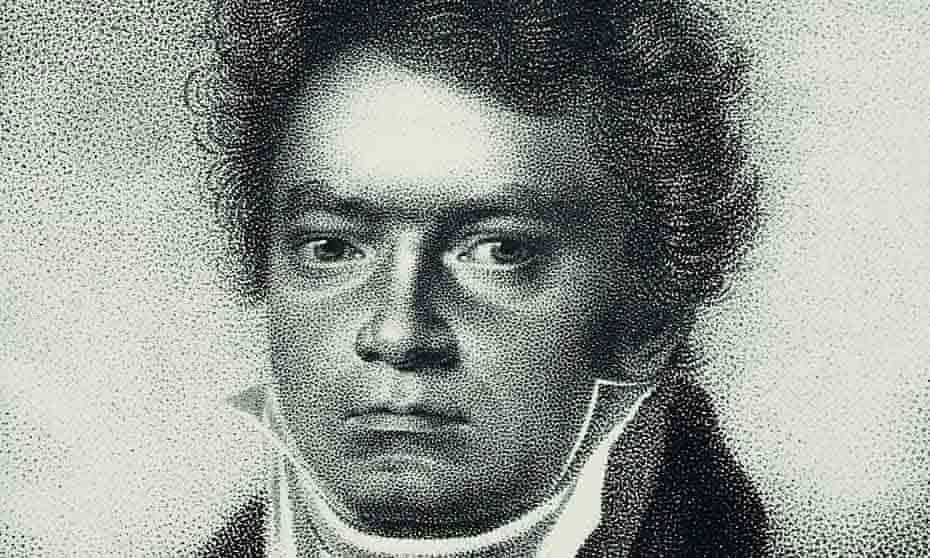Ludwig van Beethoven had over 600 brilliant musical compositions. The cult composer, who began to lose his hearing after the age of 25, did not stop composing compositions until the end of his life. Beethoven's life is an eternal struggle with difficulties. And only writing compositions allowed him to enjoy sweet moments.

The childhood and youth of the composer Ludwig van Beethoven
The famous composer was born in December 1770 in one of the poorest neighborhoods in Bonn. The baby was baptized on December 17th. The boy inherited a chic voice and incredible hearing from the head of the family and grandfather.
Beethoven's childhood was not very happy. The drunken father raised his hand to his son from time to time. It was not like the traditional concept of a "happy family."
The father, who almost always spent his day with a glass of alcoholic drink in his hands, took out his evil on his wife. Beethoven truly loved his mother, because she made him feel loved and needed. She sang lullabies to the boy, and he fell asleep in her gentle embrace.
At an early age, parents noticed their son's interest in music. My father wanted to bring up worthy competition to Mozart, who was then the undoubted idol of millions. The boy's life is now filled with warmer moments. He studied violin and piano.
When the teachers realized that Beethoven Jr. was gifted, they told the head of the family about this. The father, who shifted the responsibility to his son, forced the boy to play five musical instruments. Young Beethoven spent hours in class. Any misconduct on the part of the son was punishable by physical violence.
Composer's parents
The boy's father wanted him to quickly master musical notation. He had only one goal - for Beethoven to play for money. By the way, from the fact that the boy began to give concerts, the family did not improve their financial situation. Firstly, the proceeds were insignificant, and secondly, the money that the guy earned was spent on drink by his father.
Mom, who doted on her son, supported his creative endeavors. She idolized Beethoven and did everything for his development. Soon the boy began to outline his own compositions. Brilliant compositions arose in his head, which he wrote down in a notebook. Louis was so immersed in the world of creating works that when compositions were born in his head, Beethoven could not think of anything else but the melody.

In 1782, Christian Gottlob became the head of the court chapel. He took the young Beethoven under his wing. To Christian, the guy seemed very gifted.
He not only studied music with him, but also introduced him to the wonderful world of literature and philosophy. Ludwig enjoyed the compositions of Shakespeare and Goethe, listened to the compositions of Handel and Bach. Then Beethoven had another cherished desire - to get to know Mozart.
A new stage in the life of the musician Ludwig van Beethoven
In 1787, the famous composer visited Vienna for the first time. There the maestro met the famous composer Wolfgang Amadeus Mozart. His dream came true. When Mozart heard the compositions of the young talent, he said the following:
"Watch Ludwig. Very soon the whole world will speak in it.
Beethoven dreamed of taking at least a few lessons from his idol. Mozart graciously agreed. When classes began, the composer had to return to his homeland. The fact is that Beethoven received sad news from his home. His mother died.
Beethoven came to Bonn to see his mother on her last journey. The death of the dearest person in the world shocked him so much that he could no longer create. He was on the verge of a nervous breakdown. Louis was forced to pull himself together. Beethoven was forced to look after his brothers and sisters. He protected the family from the antics of his alcoholic father.
Neighbors and familiar families scoffed at Beethoven's position. He had to leave music to support his family. He once said that he would earn a lot of money from his compositions.
Soon, Louis had secret patrons, thanks to whom he appeared in the salons. The Breuning family took the talented Beethoven "under their wing". The musician taught music lessons for the daughter of the family. Interestingly, the maestro was friends with his student until the end of his days.
The creative path of Ludwig van Beethoven
Soon the maestro again poisoned himself in Vienna. There he quickly found friends-philanthropists. He turned to Joseph Haydn for help. It was to him that he brought his early compositions for verification. By the way, Josef was not happy with his new acquaintance. He hated the persistent Beethoven and did everything to ensure that he quickly disappeared from his life.
Then Louis took craft lessons from Schenk and Albrechtsberger. He perfected the art of composition with Antonio Salieri. He introduced the young talent to professional musicians and composers, which foreshadowed the improvement of Beethoven's position in society.

A year later, he wrote the musical accompaniment to the symphony "Ode to Joy", written by Schiller for the Masonic Lodge. Louis was dissatisfied with the work, which cannot be said about the enthusiastic audience. He tried to change the composition, and in 1824 he was satisfied with the changes made.
A new title and an unpleasant diagnosis
Without realizing it, Beethoven received the title of "The Most Popular Musician and Composer of Vienna." In 1795 he made his debut in the salon. The composer charmed the audience with the soulful play of his own compositions. The audience noted the temperamental play and spiritual depth of the musician. Three years later, doctors diagnosed the maestro with a disappointing diagnosis of Tinnitus. The disease progressed day by day.
Tinnitus is ringing or noise in the ears without an external acoustic stimulus.
For more than 10 years, Louis managed to hide from friends and the public that he suffered from tinnitus. He succeeded. When a failure occurred during the composer's playing of musical instruments, the audience thought that this was due to inattention. Soon he wrote a composition that he dedicated to the brothers. We are talking about the composition "Heiligenstadt testament". In the work, he shared with relatives personal experiences for the future. He asked them to publish the recording after his death.
In his notes to Wegeler, he wrote: "I will not give up and I will take fate by the throat!" Despite the disease, which deprived him of the most important thing - the ability to hear normally, he wrote cheerful and expressive compositions. Louis placed all his experiences in Symphony No. 2. The maestro realized that he began to gradually lose his hearing. He took up the pen and began to actively replenish the repertoire with brilliant compositions. It is this period that biographers consider the most productive.
The heyday of Ludwig van Beethoven
In 1808, the composer composed the composition "Pastoral Symphony", which included five parts. This work has taken an important place in the creative biography of Louis. He spent a significant amount of time in picturesque places, enjoying the amazing beauty of the settlements. It is not surprising that one of the parts of the symphony was called “Thunderstorm. Storm". The composer, with innate sensitivity, conveyed what happens during a natural disaster.
A year later, the leadership of the local theater invited the composer to write a musical accompaniment to the play "Egmont" by Goethe. Surprisingly, Louis refused to work for money. He wrote music for free, in honor of respect for the writer.
From 1813 to 1815 Beethoven was very active. He composed a significant number of compositions, because he realized that he was losing his hearing. Every day the condition of the maestro worsened. He hardly heard the music. To find a way out, he used a wooden stick, which was shaped like a pipe. The maestro inserted one end into the ear, and brought the other to the musical instrument.
Those works that Beethoven wrote during this difficult period are filled with pain and philosophical meaning. They were tragic, but at the same time sensual and lyrical.
Details of privacy
Ludwig van Beethoven failed to build a relationship. Representatives of the weaker sex paid attention to him. Unfortunately, he was a commoner, so he had no right to court women from the elite circle.
Julie Guicciardi is the first girl who pierced the composer's heart. It was unrequited love. The girl met two men at the same time. But she gave her heart to Count von Gallenberg, whom she soon married. Beethoven was very worried about breaking up with a girl. He conveyed his experiences in the sonata "Moonlight Sonata". Interestingly, today it is the anthem of unrequited love.
He soon fell in love with Josephine Brunswick. She enthusiastically answered his notes and encouraged Louis that he would become her chosen one. The relationship ended before it began to develop. The fact is that the girl's parents strictly ordered her to refuse to communicate with the commoner Beethoven. They did not want to see him next to their daughter.
He then proposed marriage to Teresa Malfatti. The girl could not reciprocate the maestro. After that, the depressed Louis wrote the brilliant composition "For Elise".
He was unlucky in love. From any relationship, even the most platonic, the composer was hurt. The maestro decided to no longer be in a love relationship. He vowed to spend the rest of his life in solitude.
In 1815, the elder brother died. Louis was forced to take custody of a relative's son. The mother of the child, who did not have a very good reputation, signed the documents that she was giving her son to the composer. Ludwig became the guardian of Karl (Beethoven's nephew). The maestro did everything to ensure that his relative inherited the talent.
Beethoven brought up Karl in severity. From early childhood, he tried to keep him from bad habits that he could inherit from his mother. Louis studied music with his nephew and did not allow him too much. Such severity of the uncle pushed the guy to the fact that he tried to voluntarily die. The suicide attempt was unsuccessful. Carl was sent to the army. The nephew inherited the property of the famous maestro.
Interesting facts about Ludwig van Beethoven
- The exact date of birth of the maestro is unknown. But it is generally accepted that he was born on December 16, 1770.
- He was a difficult person with a complex character. Louis had a high opinion of himself. Once he said: "There is no work that would be too learned for me ...".
- He was going to dedicate one of his compositions to Napoleon. But he changed his mind when he betrayed the ideas of the revolution and proclaimed himself emperor.
- Beethoven dedicated one of his compositions to a dead dog, calling it "An Elegy on the Death of a Poodle".
- The maestro worked on "Symphony No. 9" for 9 years.
The last years of Ludwig van Beethoven's life
In 1826 he caught a very cold. Later, the disease progressed and turned into pneumonia. Then more pain in the gastrointestinal tract was added. The doctor who treated the maestro incorrectly calculated the dosage of the medicine. Everything led to the fact that the disease progressed.
He died on March 26, 1827. At the time of his death, Louis was only 57 years old. His friends said that at the time of his death, the sound of rain, lightning and thunder could be heard outside the window.
An autopsy showed that the composer's liver had decomposed, and the auditory and adjacent nerves were also damaged. The funeral was attended by 20 thousand citizens. The funeral procession was led by Franz Schubert. The body of the musician was buried in the Waring cemetery, near the Church of the Holy Trinity.



